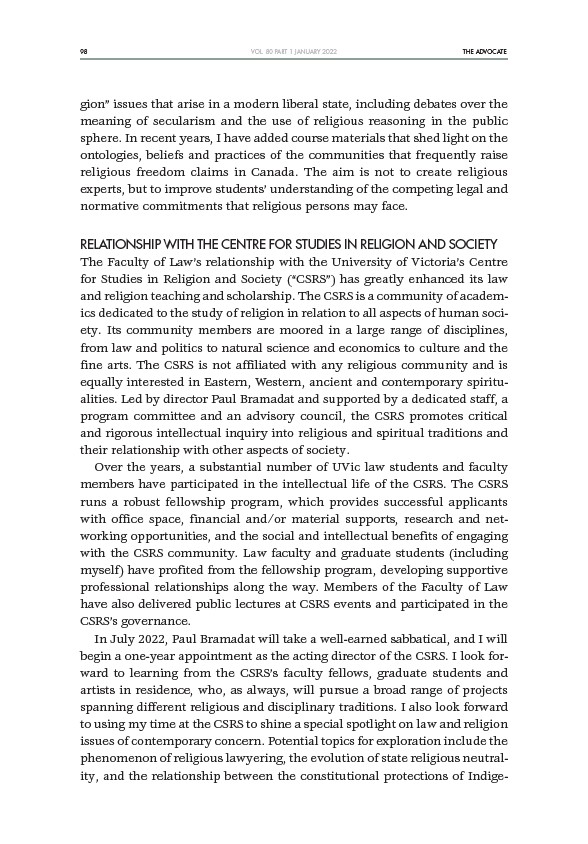
98 THE ADVOCATE
VOL. 80 PART 1 JANUARY 2022
gion” issues that arise in a modern liberal state, including debates over the
meaning of secularism and the use of religious reasoning in the public
sphere. In recent years, I have added course materials that shed light on the
ontologies, beliefs and practices of the communities that frequently raise
religious freedom claims in Canada. The aim is not to create religious
experts, but to improve students’ understanding of the competing legal and
normative commitments that religious persons may face.
RELATIONSHIP WITH THE CENTRE FOR STUDIES IN RELIGION AND SOCIETY
The Faculty of Law’s relationship with the University of Victoria’s Centre
for Studies in Religion and Society (“CSRS”) has greatly enhanced its law
and religion teaching and scholarship. The CSRS is a community of academics
dedicated to the study of religion in relation to all aspects of human society.
Its community members are moored in a large range of disciplines,
from law and politics to natural science and economics to culture and the
fine arts. The CSRS is not affiliated with any religious community and is
equally interested in Eastern, Western, ancient and contemporary spiritualities.
Led by director Paul Bramadat and supported by a dedicated staff, a
program committee and an advisory council, the CSRS promotes critical
and rigorous intellectual inquiry into religious and spiritual traditions and
their relationship with other aspects of society.
Over the years, a substantial number of UVic law students and faculty
members have participated in the intellectual life of the CSRS. The CSRS
runs a robust fellowship program, which provides successful applicants
with office space, financial and/or material supports, research and networking
opportunities, and the social and intellectual benefits of engaging
with the CSRS community. Law faculty and graduate students (including
myself) have profited from the fellowship program, developing supportive
professional relationships along the way. Members of the Faculty of Law
have also delivered public lectures at CSRS events and participated in the
CSRS’s governance.
In July 2022, Paul Bramadat will take a well-earned sabbatical, and I will
begin a one-year appointment as the acting director of the CSRS. I look forward
to learning from the CSRS’s faculty fellows, graduate students and
artists in residence, who, as always, will pursue a broad range of projects
spanning different religious and disciplinary traditions. I also look forward
to using my time at the CSRS to shine a special spotlight on law and religion
issues of contemporary concern. Potential topics for exploration include the
phenomenon of religious lawyering, the evolution of state religious neutrality,
and the relationship between the constitutional protections of Indige-